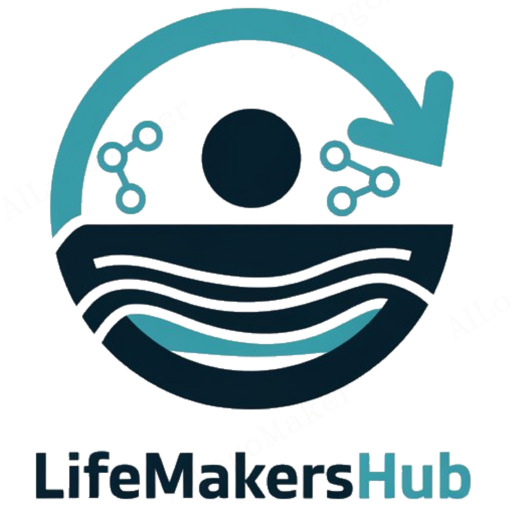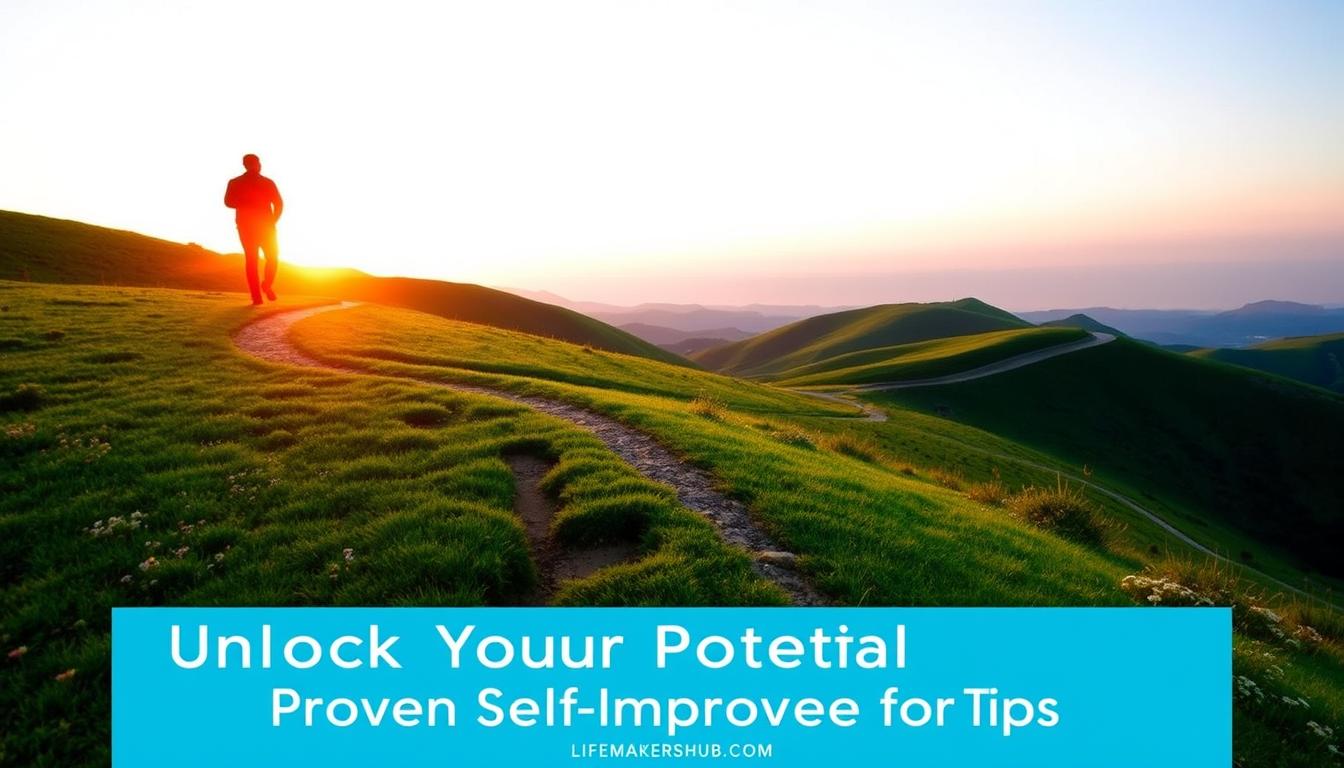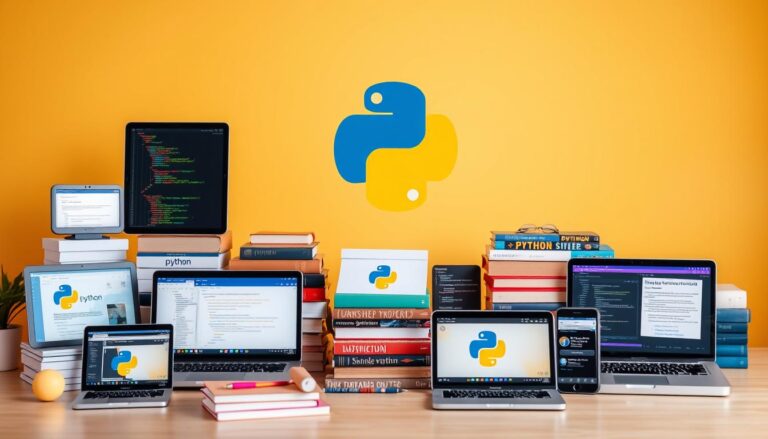Unlock Your Potential: Proven Self-Improvement Tips
Start a journey of self growth with tips backed by science. This guide helps you unlock your potential and thrive. Every day, professionals aim to improve. But how do you make ambition into results?
Science proves small, consistent efforts lead to big changes. For instance, setting SMART goals can boost success by 50%. A growth mindset can increase goal success by 34%.
Even 10 minutes of daily mindfulness can improve emotional stability by 23%. This article uses research from the CDC, BetterUp, and studies to help you build lasting habits.
Key Takeaways
- SMART goals increase success rates by 50% through structured planning.
- A growth mindset raises goal achievement by 34% compared to fixed mindsets.
- 10 minutes daily mindfulness reduces stress by 30% and sharpens focus.
- 7-8 hours of sleep improves productivity by 20%—a CDC-backed fact for daily energy.
- Journaling boosts goal success by 40% through reflection and clarity.
The Science Behind Effective Self Improvement
Understanding how your brain adapts is key to lasting change. Neuroplasticity—your brain’s ability to rewire—means your potential isn’t fixed. Small, consistent efforts can reshape how you think and act. Let’s dive into how this science turns goals into real results.
“A growth mindset believes abilities can be developed through effort.” — Carol Dweck, Stanford psychologist
How Neuroplasticity Enables Personal Growth
Think of your brain as a garden. Neural pathways grow stronger with focus and repetition. Studies show habits like journaling or mindfulness change brain structures, supporting positive behaviors. For instance, a Harvard study found deliberate practice boosts performance by 40% in just 8 weeks.
Research-Backed Benefits of Self-Development
Scientific evidence supports the value of effort. Key findings include:
- 21 days is the average time to form new habits (Lally et al., 2010)
- Goal-setting frameworks increase success rates by 23% (Locke & Latham, 2002)
- Transformative learning accelerates problem-solving skills by 35% (Zull, 2002)
The Psychology of Transformative Change
| Psychological Principle | Real-World Application | Behavioral Science Insight |
|---|---|---|
| Growth Mindset | Reframing failures as learning | Carol Dweck’s work shows this reduces fear of mistakes by 40% |
| Cognitive Change | Weekly skill mastery tracking | Enables measurable progress visualization |
| Identity Shifts | Public accountability commitments | Triggers social reinforcement loops (B.J. Fogg’s behavior model) |
Whether it’s optimizing workflows or building resilience, this science shows anyone can reprogram their potential. Next, we’ll explore how to use these principles for lasting transformation.
Cultivating a Growth Mindset for Lasting Change
Carol Dweck’s research shows a growth mindset changes how we see challenges. It’s different from a fixed mindset, which believes talent is just given. A growth mindset thinks abilities grow with effort.
Imagine you’re facing a hard project. Someone with a fixed mindset might be scared to try, fearing they’ll fail. But someone with a growth mindset will say, “What can I learn here?”
Begin by spotting limiting beliefs like “I’m not good at this.” Change them to “I’m getting better.” Adding “yet” to statements, like “I haven’t mastered this yet,” changes how we see things. This small change is part of a mindset shift, turning problems into chances to grow.
- Ask, “What’s one small step I can take today?”
- See failure as a chance to learn: “This didn’t work—what’s the lesson?”
- Focus on progress, not just results, to build strength.
Michele Obama suggests taking small steps towards change. Every setback is a chance to learn and grow. A growth mindset doesn’t get rid of fear but turns it into curiosity. When trying something new, see mistakes as part of the learning process, not as proof you’re not good enough.
Remember, changing your mindset takes time and effort. Keep track of your progress each week. Notice when you say “I can’t” and change it to “I’m learning.” With time, this habit will change how you tackle goals, turning limiting beliefs into stepping stones. Your potential is not fixed; it’s a journey of discovery. Start small, stay consistent, and watch your mindset grow.
Essential Habits That Accelerate Personal Development
What if small changes could change your life? Let’s look at habits that make a big difference.
Morning Routines of Highly Successful People
Successful people start their day with a plan. Waking up at the same time helps your body adjust. Getting sunlight early helps your mood and energy.
Drinking water, eating well, or meditating for a few minutes sets a positive tone. Even a short journal entry or listening to a podcast can help you grow a little each day. The goal is to keep moving forward, not to be perfect.
70% of people who reflect weekly find it helps them grow faster—proof that planning helps build habits.
The Power of Consistent Micro-Improvements
Micro-habits add up over time, as kaizen teaches. A short workout each day builds strength. A short study session improves your skills.
These small steps can lead to big changes. For example, reading 20 pages a day adds up to 7,300 pages a year. Use apps like Headspace to track your progress and celebrate your achievements. Remember, small daily improvements can double your effectiveness in a year.
Breaking Negative Patterns That Limit Growth
To overcome obstacles, first identify limiting habits. Track your negative patterns for a week. Then, replace them with better habits.
Use strategies like the “2-minute rule” to start small. For example, if you find yourself procrastinating, do something fun instead. This can help you break bad habits.
Habit Stacking Techniques for Busy Individuals
Busy people can use habit stacking to their advantage. Attach new habits to things you already do.
| Anchor Habit | New Action |
|---|---|
| Brushing teeth | 1 push-up (builds strength gradually) |
| Commute | Listen to educational podcasts |
| Lunch break | 5-minute gratitude journaling |
By adding small steps to your daily routine, they become automatic. Even a short walk in the morning can help you focus.
Every habit, no matter how small, shapes your future. Pick one thing to change today. Your future self will be grateful.
Physical Wellness as the Foundation for Self Improvement

Your mind and body are connected, influencing your growth. Building a strong wellness foundation is more than just looking good. It’s about getting the mental clarity to reach your goals. Studies show that exercise boosts brain health, improving focus and creativity.
“Physical activity isn’t a luxury—it’s a core tool for mental performance.”
Exercise: Fuel for the Brain
Exercise makes your brain stronger. Aim for 150 minutes of moderate physical activity each week. This can be brisk walking or cycling, which helps with memory and problem-solving. Even short exercises, like 10-minute walks, can refresh your mind.
For those with busy lives, try fitness for mental performance routines. Yoga can improve focus, while HIIT boosts motivation. Regular exercise also lowers stress hormones, reducing anxiety by up to 30%.
- 30-minute daily walks improve mood and decision-making.
- Strength training twice a week builds resilience to stress.
- Mindful movement (yoga/pilateses) sharpens emotional regulation.
Nutrition: The Cognitive Diet
What you eat affects your brain health. Focus on a cognitive diet with omega-3s (salmon, walnuts), antioxidants (berries, leafy greens), and fiber. Avoid sugary foods to keep your energy steady. Studies show these choices improve mental clarity and reduce brain fog.
Pro tip: Swap midday snacks for nuts and seeds. They’re full of nutrients that support brain nutrition. Small changes, like drinking herbal tea instead of soda, can make a big difference.
Remember, your body and brain are in this together. Start small by walking during calls, eating smart, and getting enough sleep. Every step you take strengthens your wellness foundation and your potential.
Emotional Intelligence: The Overlooked Key to Personal Growth
Emotional intelligence (EQ) is more than just a trend—it’s the core skill for success in work, relationships, and health. Studies show EQ affects leadership and mental health. EQ is built on five key areas: self-awareness, self-regulation, motivation, empathy, and social skills. These areas help you handle life’s challenges with understanding and kindness.
“Emotional intelligence is the single most important skill for success in any field.”—Daniel Goleman
Begin by improving self-awareness. Ask yourself what makes you react. A study found mindfulness boosts emotional control by 30%. Reflecting or journaling can reveal patterns, helping you choose your actions wisely.
Then, focus on social skills as much as technical skills. Listening well and showing empathy builds trust. This is key for teamwork and leadership. For instance, high EQ employees cut down workplace conflicts by 20%, boosting teamwork and creativity.
- Practice daily check-ins to track emotions and triggers.
- Seek feedback to uncover blind spots—research shows this boosts EQ by 15%.
- Engage in role-playing exercises to strengthen empathy and communication.
EQ can grow with effort—relationship intelligence improves with practice. Tools like AlignUs help track your progress. Small actions, like pausing before reacting or celebrating small wins, can make a big difference. EQ changes how you connect with others and yourself, unlocking potential in all areas of life. Are you ready to start? Your next conversation is a chance to practice.
Mastering Time Management for Self-Development Success
Time is your most limited resource. Learning to manage it well changes how you spend your hours. Studies show that good systems can increase productivity by 25%. But, they must fit your unique way of working.
“The key is not to prioritize what’s on your schedule, but to schedule what you prioritize.”
Start by checking your productivity systems. Try the Pomodoro Technique (25-minute focus sessions) or the Eisenhower Matrix (sort tasks by urgency and importance). Use task management apps (like Trello or Notion) to keep track of your tasks. The aim is to match your strategic priorities with your long-term goals.
- Work efficiency starts with cutting out time-wasters. Monitor your digital habits, like email and social media checks. Set limits and turn off non-essential notifications during focus times.
- Keep your strategic priorities safe. Use weekly reviews to balance your time. Spend mornings on important tasks when you’re most focused.
- Use attention management techniques. Interruptions can cut productivity by 60%. Schedule uninterrupted time for key tasks.
How you spend your time affects your results. By using tested time management methods and focusing on what’s truly important, you can save hours. Your growth depends on systems that work with you, not against you.
Learning Strategies That Maximize Knowledge Retention
Building expertise isn’t just about time spent—it’s about how you engage with information. Let’s explore methods proven to turn knowledge into lasting skills.
Deliberate Practice: The Path to Expert Performance
Deliberate practice isn’t just repeating tasks—it’s focused practice targeting weak areas. For example, a musician drills difficult passages instead of playing entire pieces. This method accelerates skill mastery by 50% faster than passive study, according to expert performance research. To start: set clear goals, track progress, and seek immediate feedback. Tools like Anki for spaced repetition pair deliberate practice with science-backed learning technology.
Digital Tools That Boost Learning Efficiency
Modern digital learning tools make skill development faster. Try these categories:
- Spaced Repetition Apps: Anki, Quizlet—reinforce concepts at optimal intervals
- Note-Taking Systems: Notion or Obsidian for information organization
- Collaboration Platforms: Miro for visual brainstorming
Building Your Knowledge Ecosystem
A personal wiki acts as your brain’s external memory. Use tools like Roam Research to create interconnected notes—this turns raw data into actionable insights. Pair this with knowledge management tools like Trello for project tracking.
| Learning Method | Retention Rate |
|---|---|
| Lectures | 5% |
| Practice by Doing | 75% |
| Teaching Others | 90% |
According to the learning pyramid, teaching others boosts learning retention by 90%—a tactic every professional should adopt.
Combine these strategies to build a system where knowledge evolves into expertise. Your journey to skill development starts with intentional design.
Building Meaningful Relationships That Support Growth
Did you know supportive relationships can boost your success by 50%? They’re not just for socializing; they help you grow. Your network influences your mindset, opportunities, and how you bounce back from challenges. Let’s dive into how to create connections that help you advance without losing your true self.
| Relationship Type | Action Steps | Impact |
|---|---|---|
| Mentorship | Identify mentors in your field—ask for 15-minute calls or shadowing opportunities | Guidance cuts learning curves; 70% feel less stress with strong mentors |
| Peer Networks | Create or join groups focused on shared goals (e.g., online forums, masterminds) | Collaboration increases accountability and innovation |
| Weak Ties | Attend industry events or use platforms like LinkedIn for networking for growth | Expand opportunities—weak ties contribute to 85% of new ideas in professional networks |
Skills like active listening can cut down on conflict by 40%. Try mirroring what others say before you respond. Focus on building a strong community by investing in a few key relationships. Setting clear boundaries is crucial for 60% of successful relationships.
Don’t forget to show gratitude—it can make you 30% happier, studies show. Begin with small steps: have a coffee with someone new or go to one networking event this month. Remember, your journey to growth is a team effort. Seek out connections that push you to grow, not just keep you comfortable.
Financial Literacy as a Pillar of Self Improvement
Financial literacy is more than just numbers. It’s a key to long-term financial growth. Sadly, 26 U.S. states don’t teach financial education in schools. This leaves millions unprepared. Yet, 60% of adults worry about money (FINRA 2021).
Without investment knowledge, building wealth or making big career changes is tough. Let’s see how smart money management helps you reach monetary freedom.
“Financial stability starts with understanding where your money goes.” – FINRA 2021 Report
| Category | Allocation | Goal |
|---|---|---|
| Needs | 50% | Maintain economic stability |
| Wants | 30% | Align with value-based finances |
| Savings/Debt | 20% | Build wealth, secure financial independence |
Begin with financial planning. Use the 50/30/20 rule for mindful spending and savings. Put 20% of your income into savings and emergency funds (3–6 months’ expenses) and retirement. Keep track of how your spending aligns with your goals. Ask yourself: Does this purchase match my values?
- Track your monthly expenses to find conscious consumption habits.
- Pay off high-interest debt first to free up cash for wealth building.
- Use financial mindfulness to avoid lifestyle inflation—spend less than you earn.
Financial literacy turns money into fuel for growth. By learning wealth management, you can fund education, career changes, or mentorship. Start small—adjust your budget, automate savings, and focus on economic stability. Your future self will be grateful.
Overcoming Plateaus and Setbacks in Your Development Journey

Personal growth isn’t always easy—it has ups and downs. Did you know 70% of people hit plateaus? This isn’t failure; it’s proof you’re pushing limits. Let’s turn these moments into fuel for progress.
“Setbacks and failures are common reasons for giving up, but 50% of those who learn from mistakes succeed later.”
Plateaus often come from two main reasons: your brain solidifying new skills or getting too comfortable. Here’s how to handle them:
- Adapt your approach—if progress stalls, being flexible boosts problem-solving by 25%. Try new methods instead of sticking to old habits.
- Visualize success—imagine your goal every day. Studies show this boosts outcomes by 20%, making setbacks feel smaller.
- Embrace “stuck” moments—plateaus are part of mastering skills. Even Picasso and Bach started as beginners. Their perseverance strategies built legendary mastery over decades.
Building resilience starts with changing your mindset. When facing challenges, ask: “What can I learn here?” Perseverance strategies like daily practice reduce stagnation by 35%. Remember: growth peaks come after valleys. Every obstacle is data, not defeat. Keep moving forward—one step at a time.
Conclusion: Integrating Self-Improvement Practices Into Your Authentic Life Path
Self-improvement isn’t just a list to check off. It’s about holistic integration. When you align practices with your true self, your journey becomes truly meaningful. Think of habits, goals, and setbacks as threads in your unique story of authentic development.
This isn’t about strict plans. It’s about creating space for balanced growth that respects your priorities and pace. It’s about living life on your terms.
Start by mapping your strengths. Tools like the HIGH5 assessment can guide you. Written plans can increase success by 42%. And having an accountability partner can boost achievement by 65%.
These steps lay the groundwork for sustainable improvement. Take time each week to reflect—70% of journalers feel clearer. Ask yourself: Does this practice align with my values? Does it fuel my purpose?
Personal congruence means choosing practices that fit your life’s rhythm. Maybe that’s 10 minutes of mindfulness daily or better sleep routines. Even small changes, like breaking goals into steps, can motivate you by 20%.
Embrace flexibility—stress drops by 50% when you balance growth with self-compassion. Celebrate your progress, not perfection.
Start today. Choose one habit to integrate, like gratitude journaling or a 15-minute walk. Track its impact. Over time, these choices will create momentum toward a life where growth feels natural, not forced.
Remember, lasting change happens when improvement becomes part of who you are, not something you do. What’s your first step?
FAQ
What is the significance of neuroplasticity in personal growth?
How can I benefit from structured self-development practices?
What is a growth mindset and why is it important?
What are some effective morning routines to enhance productivity?
How do small, consistent improvements shape long-term success?
What is habit stacking and how can I implement it?
Why is physical wellness critical to my self-improvement journey?
What role does emotional intelligence play in personal development?
How can I optimize my time management for personal growth?
What strategies can I use for building effective learning practices?
How do I establish meaningful relationships that promote growth?
What financial principles should I consider for supporting my growth?
How can I maintain progress during setbacks in my journey?
Source Links
- Unlock Your Potential: 7 Proven Strategies for Rapid Self-Improvement – https://medium.com/@igorgrochu/title-unlock-your-potential-7-proven-strategies-for-rapid-self-improvement-063e1a17a29c
- How To Improve Yourself Every Day: 20 Ways To Be Better – https://www.betterup.com/blog/how-to-better-yourself
- Personal Development : Unlock Your Full Potential – https://medium.com/@dinukamax1/personal-development-unlock-your-full-potential-f6b6a2b946fc
- What Neuroscience Says on Why Self Improvement is So Effing Hard (and What to Do About It) — Michael J. Mehlberg – https://michaelmehlberg.com/blog/2019/9/13/what-neuroscience-says-on-why-self-improvement-is-so-effing-hard-and-what-to-do-about-it
- The Science of Self-Improvement: Evidence-Based Strategies for Success – https://www.linkedin.com/pulse/science-self-improvement-evidence-based-strategies-success-luckey-ftvic
- How to Cultivate a Growth Mindset for Lifelong Learning and Joy – – https://changesbigandsmall.com/how-to-cultivate-a-growth-mindset-for-lifelong-learning-and-joy/
- Cultivating a Growth Mindset – https://www.susandavid.com/newsletter/cultivating-a-growth-mindset/
- How To Develop a Growth Mindset and Change Your Life – https://medium.com/change-your-mind/how-to-develop-a-growth-mindset-and-change-your-life-6a0dbab54b7
- 11 Essential Morning Habits To Accelerate Your Self-Improvement – This Evergreen Home – https://thisevergreenhome.com/11-essential-morning-habits-to-accelerate-your-self-improvement/
- 3 Self-Improvement Essentials That Aren’t Obvious to Everyone – https://www.psychologytoday.com/us/blog/in-practice/202501/3-self-improvement-essentials-that-arent-obvious-to-everyone
- 10 Habits to Accelerate Personal Growth – https://medium.com/@findyouway/10-habits-to-accelerate-personal-growth-11cf9fc13b96
- How to look after your mental health using exercise – https://www.mentalhealth.org.uk/explore-mental-health/publications/how-look-after-your-mental-health-using-exercise
- What is Self-Care and Why is it Important For You? – https://www.snhu.edu/about-us/newsroom/health/what-is-self-care
- Examining Physical Wellness as the Fundamental Element for Achieving Holistic Well-Being in Older Persons: Review of Literature and Practical Application in Daily Life – https://pmc.ncbi.nlm.nih.gov/articles/PMC10329914/
- Unlocking the Secrets of Emotional Intelligence: Strategies for Personal Growth and Development – https://medium.com/@ciaranpconnolly/unlocking-the-secrets-of-emotional-intelligence-strategies-for-personal-growth-and-development-65168f5705d8
- Emotional Intelligence: The Key to Thriving in Personal and Professional Relationships – https://alignusworld.com/emotional-intelligence-the-key-to-thriving-in-personal-and-professional-relationships/
- Mastering Time Management And Personal Development for Success in Life – https://practical-management-skills.com/time-management/time-management-and-personal-development/
- Mastering Your Time: Strategies for Better Time Management – https://medium.com/change-your-mind/mastering-your-time-strategies-for-better-time-management-9ff5936ab15c
- Knowledge Retention: 8 Main Strategies To Improve It – https://www.educate-me.co/blog/knowledge-retention-strategies
- 11 Strategies for Improving Learning Retention (2025) – https://whatfix.com/blog/learning-retention/
- Top tips on building and maintaining healthy relationships – https://www.mentalhealth.org.uk/our-work/public-engagement/healthy-relationships/top-tips-building-and-maintaining-healthy-relationships
- From Self-Development to Building Meaningful Relationships: The Next Chapter – https://medium.com/mind-talk/from-self-development-to-building-meaningful-relationships-the-next-chapter-c7aed512e842
- Growth in Relationships: 5 Ways to Create a Growth-Oriented Relationship – https://anchorlighttherapy.com/how-to-have-a-growth-oriented-relationship/
- Financial Literacy | First Seacoast Bank – https://www.firstseacoastbank.com/financial-literacy
- 5 Key Pillars of Financial Literacy – https://www.uthrive.academy/blog/5-key-pillars-of-financial-literacy
- Five pillars of financial literacy you can master – https://www.aia.com/en/health-wellness/healthy-living/healthy-finances/Financial-literacy-fundamental
- Elevating Your Progress: Breaking Through Plateaus and Embracing Growth – https://wayoftheinterceptingmind.medium.com/elevating-your-progress-breaking-through-plateaus-and-embracing-growth-98ec9bfad8
- How to Overcome Setbacks, Impatience, and Plateaus When Mastering a New Skill – https://www.linkedin.com/pulse/how-overcome-setbacks-impatience-plateaus-when-new-skill-velasquez
- Self-Improvement – Why & How To Improve Yourself – https://high5test.com/self-improvement/
- The Power of Self Reflection: How to Foster Personal Growth | Everyday Speech – https://everydayspeech.com/blog-posts/general/the-power-of-self-reflection-how-to-foster-personal-growth/







